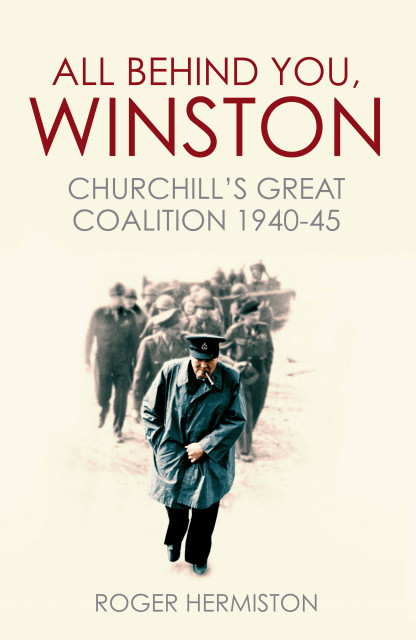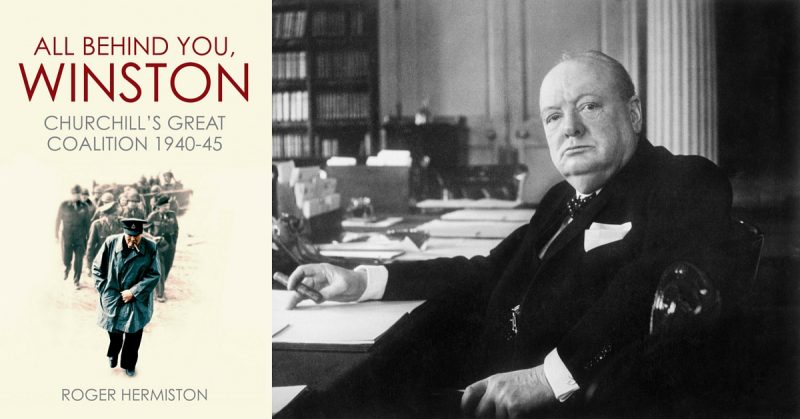This book by Roger Hermiston takes us back to World War II and the creation of the coalition government in Britain headed by Winston Churchill. The author introduces us to many of the key ministers in that government and some of the leading figures supporting them.
It is often tempting to think of Britain’s wartime regime as being entirely focused around Churchill. Love him or loathe him, he remains a towering figure in British politics and history. There is no question that his leadership during the early part of the war cemented his greatness; he was tireless in his efforts to drive the country on through the darkest days. Despite the toll it took on him, he did not falter, and eventually led the country through to victory.
Yet to understand Churchill properly we have to look beyond his famous speeches and his finest hours, to his earlier political career. He was a man who divided opinion in and out of parliament. He made friends and enemies in equal measure, often within his own party. He was a leading voice among those denouncing the failed appeasement endeavor, recognizing its folly at once.
Churchill’s ideology confronted the ambitions of Britain’s Labour movement, that had grown in influence in the aftermath of the Great War when unemployment and poverty were rife across much of the United Kingdom. For some, Churchill represents the political class who stood in the way of the aspirations of a people yearning for social change. The fact that millions had endured a terrible war and yet seen hopes of reform shattered in a post-war climate without a peace dividend caused lasting resentment towards the ruling elite Churchill epitomized. That he feared and loathed socialism is well known, so it seems incredible that he could sit at a table with Labour MPs and find an amicable way of running Britain during its greatest crisis. It is as much a testament to Churchill as it is to his erstwhile colleagues that this union was a success.
The coalition of Tories, socialists and liberals held together through good times and bad. Their days were not only taken up with directing the war and keeping the country on its feet, but also planning for a future after the guns stopped. This latter issue was a source of great tension within the coalition, but they remained unified despite it.
Throughout the war there were immense challenges and it is remarkable that party politics could be set aside to find the right people for specific jobs. A previous National government at the start of the 1930’s had collapsed in acrimony and all the signs were there it would happen again. Yet Churchill and his deputy, Clement Attlee, aided and abetted by some exceptional men and women, kept the ship on course. The Tories were not the only party afflicted by rivalries. Labour’s Ernest Bevin and Herbert Morrison enjoyed a mutual dislike that occasionally boiled over, but for the most part they managed to get on with business. It took the influence of Clement Attlee to rein them in.
Attlee was a respected war veteran – an open minded and calming presence who swallowed the worst of Churchill’s excesses and who brought a business-like approach to leadership. He was a quiet undemonstrative man, the antithesis of Churchill’s armchair adventurist. He would go on to lead Britain through the years of reconstruction after World War II exemplified by the introduction of the National Health Service and nationalization of key industries. In this he was supported by Ernest Bevin, union supremo turned government minister, a bear of man who came from the working class. In direct opposition to his brand of politics was the prime minister’s friend Lord Beaverbrook, a press baron who liked loading the bullets for Churchill to fire. Beaverbrook’s tenure as Minister of Aircraft Production proved critical, but his jealousy of ministers with responsibilities he coveted was divisive. He would continue to have varying degrees of influence over Churchill throughout the war.
Squabbles were omnipresent within the coalition and when things divided along party lines there was always a danger the government might fall. It was the post war future that caused the most conflict. For Labour there had to be a peace dividend for the working class. Full employment and social reform were at the top of the shopping list. My father came home full of expectation after nearly six years away. He often told me that the Labour landslide in the Victory Election of 1945 had everything to do with a returning citizens army demanding the things they felt their fathers had been cheated out of in 1918. On top of this the stark failure of appeasement had tainted the Tories and for many they were unelectable. The irony of this cannot have been lost on a man like Churchill. His noisy campaign against the threat of Hitler prior to the war might have saved him, but the country yearned for change and Attlee’s Labour party were the people to bring it about.
Mr Hermiston tells a complicated story well. He introduces a great many characters – famous or otherwise – who played a roll in the downfall of Nazi Germany and Japan. This is a story of all their talents. There were some genuinely great people in Churchill’s coalition. He found a way of casting party loyalties aside to bring in the people who made a difference.
The war was won on the front line, in the air, at sea and on the factory floor. However, it might not have happened without the influence of the coalition government. They made key decisions that saw their country through the worst crisis in its history and set Britain on a path of post-war renewal. That Churchill knew how to make his own choices is represented in the people he picked to champion our democracy in the dangerous summer of 1940. That they were up to the job tells a bigger story.
It is all here in this excellent book by Roger Hermiston. Highly recommended!

Reviewed by Mark Barnes for War History Online.
ALL BEHIND YOU, WINSTON
Churchill’s Great Coalition 1940-45
By Roger Hermiston
Aurum Press
ISBN: 978 1 78131 332 2
